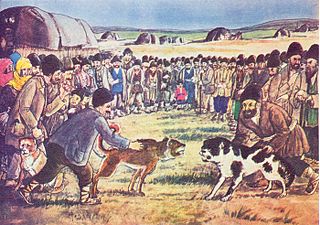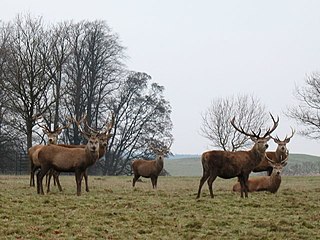
Rodeo is a competitive equestrian sport that arose out of the working practices of cattle herding in Spain and Mexico, expanding throughout the Americas and to other nations. It was originally based on the skills required of the working vaqueros and later, cowboys, in what today is the western United States, western Canada, and northern Mexico. Today, it is a sporting event that involves horses and other livestock, designed to test the skill and speed of the cowboys and cowgirls. American-style professional rodeos generally comprise the following events: tie-down roping, team roping, steer wrestling, Steer roping, saddle bronc riding, bareback bronc riding, bull riding and barrel racing. The events are divided into two basic categories: the rough stock events and the timed events. Depending on sanctioning organization and region, other events such as breakaway roping, goat tying, and pole bending may also be a part of some rodeos. The "world's first public cowboy contest" was held on July 4, 1883, in Pecos, Texas, between cattle driver Trav Windham and roper Morg Livingston.

The Wildlife and Countryside Act 1981 is an Act of Parliament in the United Kingdom implemented to comply with European Council Directive 79/409/EEC on the conservation of wild birds. In short, the act gives protection to native species, controls the release of non-native species, enhances the protection of Sites of Special Scientific Interest and builds upon the rights of way rules in the National Parks and Access to the Countryside Act 1949. The Act is split into 4 parts covering 74 sections; it also includes 17 schedules.

Bull riding is a rodeo sport that involves a rider getting on a bucking bull and attempting to stay mounted while the animal tries to buck off the rider.

Bronc riding, either bareback bronc or saddle bronc competition, is a rodeo event that involves a rodeo participant riding a bucking horse that attempts to throw or buck off the rider. Originally based on the necessary buck breaking skills of a working cowboy, the event is now a highly stylized competition that utilizes horses that often are specially bred for strength, agility, and bucking ability. It is recognized by the main rodeo organizations such as the Professional Rodeo Cowboys Association (PRCA) and the International Professional Rodeo Association (IPRA).

Dog fighting is a type of blood sport that turns game and fighting dogs against each other in a physical fight, often to the death, for the purposes of gambling or entertainment to the spectators. In rural areas, fights are often staged in barns or outdoor pits; in urban areas, fights are often staged in garages, basements, warehouses, alleyways, abandoned buildings, neighborhood playgrounds, or in the streets. Dog fights usually last until one dog is declared a winner, which occurs when one dog fails to scratch, dies, or jumps out of the pit. Sometimes dog fights end without declaring a winner; for instance, the dog's owner may call the fight.

The Royal Society for the Prevention of Cruelty to Animals (RSPCA) is a charity operating in England and Wales which promotes animal welfare.
The League Against Cruel Sports, formerly known as the League for the Prohibition of Cruel Sports, is a UK-based animal welfare charity which campaigns to stop blood sports such as fox hunting, hare and deer hunting; game bird shooting; and animal fighting. The charity helped bring about the Hunting Act 2004 and Protection of Wild Mammals (Scotland) Act 2002, which banned hunting with hounds in England, Wales and Scotland.

Cruelty to animals, also called animal abuse, animal neglect or animal cruelty, is the infliction by omission (neglect) or by commission by humans of suffering or harm upon non-human animals. More narrowly, it can be the causing of harm or suffering for specific achievements, such as killing animals for entertainment; cruelty to animals sometimes encompasses inflicting harm or suffering as an end in itself, referred to as zoosadism.
The Scottish Society for the Prevention of Cruelty to Animals is a charity to promote animal welfare in Scotland.

The Dangerous Dogs Act 1991 is an Act of the Parliament of the United Kingdom prohibiting or restricting certain types of dogs and codifying the criminal offence of allowing a dog of any breed to be dangerously out of control. After eleven horrific attacks in 1991, Home Secretary Kenneth Baker promised "to rid the country of the menace of these fighting dogs". The Act has been controversial for failing to stem the rise of dog attacks and for focusing on a dog's breed or looks instead of an individual dog's behaviour.

The Hunting Act 2004 is an Act of the Parliament of the United Kingdom which bans the hunting of most wild mammals with dogs in England and Wales, subject to some strictly limited exemptions; the Act does not cover the use of dogs in the process of flushing out an unidentified wild mammal, nor does it affect drag hunting, where hounds are trained to follow an artificial scent.

The Animal Welfare Act was signed into law by President Lyndon B. Johnson on August 24, 1966. It is the main federal law in the United States that regulates the treatment of animals in research and exhibition. Other laws, policies, and guidelines may include additional species coverage or specifications for animal care and use, but all refer to the Animal Welfare Act as the minimally acceptable standard for animal treatment and care. The USDA and APHIS oversee the AWA and the House and Senate Agriculture Committees have primary legislative jurisdiction over the Act. Animals covered under this Act include any live or dead cat, dog, hamster, rabbit, nonhuman primate, guinea pig, and any other warm-blooded animal determined by the Secretary of Agriculture for research, pet use or exhibition. Excluded from the Act are birds, rats of the genus Rattus, mice of the genus Mus, farm animals, and all cold-blooded animals.
Docking is the intentional removal of part of an animal's tail or, sometimes, ears. The term cropping is more commonly used in reference to the cropping of ears, while docking more commonly—but not exclusively—refers to the tail; the term tailing is used, also. The term has its origins in the living flesh of the tail, commonly known as the dock, from which the animal's tail hairs grow.

The Abandonment of Animals Act 1960 was an Act of Parliament in the United Kingdom. It received royal assent on 2 June 1960.

John Van "Tex" Austin was an American rodeo promoter, known as the "King of the Rodeo" or "Daddy of the Rodeo" because of his efforts to popularize the rodeo outside of its core American West demographic.

The welfare of animals in rodeo has been a topic of discussion for the industry, the public, and the law for decades.

The Animal Welfare Act 2006 is an Act of the Parliament of the United Kingdom.

The Animal Health and Welfare (Scotland) Act 2006 is an Act of the Scottish Parliament. It received Royal Assent on 11 July 2006.

A stock contractor is an individual or business that provides animals for rodeo competition. Stock contractors supply roughstock - horses for saddle bronc and bareback bronc riding and bulls for the bull riding event, plus steers for steer wrestling and team roping, plus calves for calf roping events. Use of stock contractors who specialize in providing these animals has produced a more uniform range of bucking stock which are also quieter to handle.

Animal welfare in the United Kingdom relates to the treatment of animals in fields such as agriculture, hunting, medical testing and the domestic ownership of animals. It is distinct from animal conservation.













